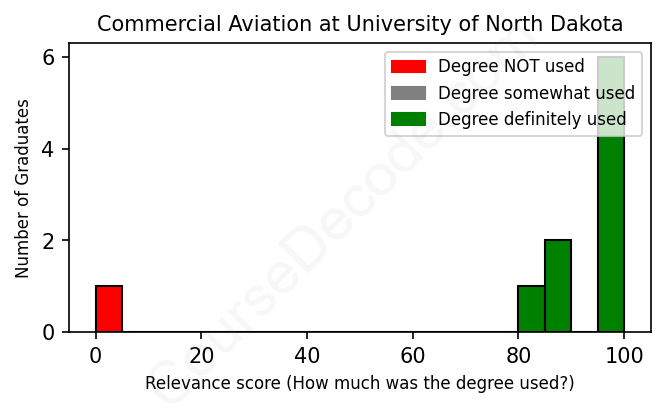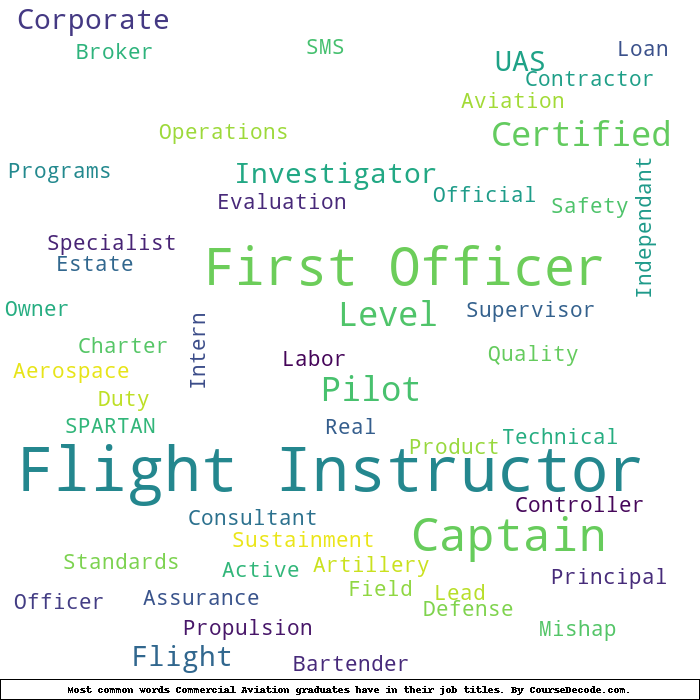
First, some facts. Of the Commercial Aviation graduates from University of North Dakota we've analyzed , here's how many have used (or NOT used) their degree in their career:

These are estimates based on AI analysis of 10 LinkedIn profiles (see below).
The verdict? Significantly above average. Overall, with an average relevance score of 85%, Commercial Aviation graduates from University of North Dakota have a much higher likelihood (+18%) of finding work in this field compared to the average graduate across all fields:
And for comparison, here's the chart for all profiles we've looked at across all degrees.
Also, after graduating, only 10% of these graduates have pursued further education other than another Bachelor's degree (such as a Masters degree or other), compared to the average across all profiles of 35%. This suggests a Bachelors degree is enough for most Commercial Aviation graduates, and it's normal to look for work straight after graduation.
See the details:
|
Relevance score: 100% We think this person has gone into a career highly relevant to their degree. We think this person has gone into a career highly relevant to their degree.
DEGREE INFOGraduated in 2015 from University of North Dakota with a Bachelor of Science in Aeronautics in Commercial Aviation. No other secondary education since. JOB HISTORY SINCE GRADUATIONCertified Flight Instructor University of North Dakota Jan 2015 - Mar 2016 Flight Operations Supervisor  University of North Dakota Jun 2015 - Mar 2016 First Officer  SkyWest Airlines Mar 2016 - Feb 2019 Captain  SkyWest Airlines Feb 2019 - Apr 2022 First Officer  Sun Country Airlines Jun 2022 - Present ABOUTAviation professional with a demonstrated history of working in the airlines / aviation industry. Skilled in Graphic Design, Business Management, Operational Efficiency, Flight Safety, and Aviation. Strong operations professional, with a Bachelor's degree focused in Commercial Aviation from University of North Dakota. |
The top 10 most common jobs done by the graduates we've analyzed (ranked most common to least) are:
When looking over the LinkedIn profiles of graduates from the University of North Dakota's Commercial Aviation program, it's clear that a good number of them are landing jobs that are pretty relevant to their degree. A bunch of folks are working as pilots—like Flight Instructors, Corporate Pilots, and First Officers at airlines. These positions really require the kind of in-depth aviation knowledge and flying skills that you pick up in a Commercial Aviation program, so it’s like they’re putting their education straight to work.
However, not everyone went the aviation route. There are a few profiles that show people taking on jobs like a Real Estate Broker or Bartender, which aren’t really connected to aviation at all. And while some roles—like Quality Assurance Specialist or even some intern positions—might touch on aspects of aviation, they don't directly pull from the core skills taught in the Commercial Aviation program. Overall, it seems like a solid chunk of the graduates are utilizing their degrees effectively in aviation-related careers, showcasing how the program really prepares students for the skies, while others have chosen different paths that aren't as linked to their studies.
Here is a visual representation of the most common words in job titles for Commercial Aviation graduates (this is across all Commercial Aviation graduates we've analyzed, not just those who went to University of North Dakota):

The career trajectories of graduates from the University of North Dakota's Commercial Aviation program tend to show a strong initial alignment with aviation-related positions. For many, their first jobs post-graduation often involve instructional roles, such as flight instructors, or entry-level positions with airlines and aviation companies. For instance, graduates like those from 2015 and 2017 quickly transitioned from instructor roles to flying as first officers for regional airlines. This trend indicates that most of the graduates are stepping into relevant jobs that build their experience and skills in the aviation sector right after graduation.
Looking further down the line, five or ten years after graduation, many alumni seem to advance their careers significantly within the aviation field. Most end up flying for larger commercial airlines or taking on specialized roles with aviation corporations and government contracts, like the graduates from 2010 and 2016 who have moved into higher positions within companies such as Insitu Inc. and NASA. However, it is worth noting that not every graduate finds their way to a traditional aviation career. For example, one 2012 graduate shifted to real estate after a stint as a corporate pilot, indicating that while many stick with aviation, some explore diverse career paths. Overall, the majority of graduates appear to have good prospects in careers closely related to their degree, especially in aviation, showing a generally successful trajectory for those who want to stay in the field.
Getting a Bachelor’s degree in Commercial Aviation, like the one at the University of North Dakota, can be pretty challenging, but it’s not impossible if you’re passionate about flying and aviation. The program blends technical coursework like aviation safety, meteorology, and flight operations with practical flying experience, so you'll definitely be juggling a lot of different subjects. While some people might find the degree easier if they’re naturally inclined towards math and science, others might struggle a bit more, especially with the hands-on flying skills you need to develop. Overall, it’s demanding but manageable if you stay focused and passionate about the field!
Most commonly, in the LinkedIn profiles we've looked at, it takes people 4 years to finish a Bachelor degree in Commercial Aviation.
So, looking at these graduates from the University of North Dakota, it seems like most of them are doing pretty well in terms of their careers and likely earning decent money. The earlier grads, especially those who’ve climbed the ladder at places like Insitu or moved up to captain positions at airlines, are probably pulling in solid salaries. Even the folks who shifted into unique roles like real estate or working at NASA seem to be landing well-paying gigs. The newer grads, like that 2023 flight instructor, are just starting out, but flight training is a decent entry point in aviation. Overall, it looks like they’re mostly on track to have successful careers with good earning potential—especially if they stick with it and keep moving up!
Here is a visual representation of the most common words seen in the "about" section of LinkedIn profiles who have a Bachelor degree in Commercial Aviation (this is across all Commercial Aviation graduates we've analyzed, not just those who went to University of North Dakota). This may or may not be useful:

Here are all colleges offering a Bachelor degree in Commercial Aviation (ordered by the average relevance score of their Commercial Aviation graduates, best to worst) where we have analyzed at least 10 of their graduates:
| College | Score | Count |
|---|---|---|
 University of North Dakota University of North Dakota
|
85 | 10 |